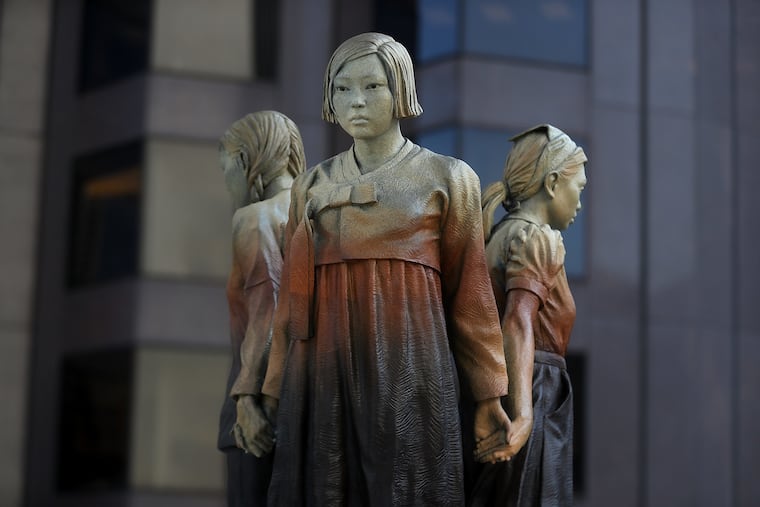Philadelphia Art Commission approves ‘comfort women’ statue to honor Korean women victimized during WWII
The statue is meant to draw attention to how the Japanese Imperial Army forced Korean women into brothels from the early 1930s through the end of World War II.

The Philadelphia Art Commission has voted to approve a proposed statute honoring so-called Korean “comfort women” who were forced into sexual slavery by the Japanese Army during World War II.
Known as The Statue of Peace, the sculpture is part of the Philadelphia Peace Plaza that is to be constructed in Queen Village. It will depict a “comfort woman” sitting in a chair with a bird perched on her shoulder, and an empty seat beside her. The statue was proposed by the Philadelphia Peace Plaza Committee.
The statue is meant to draw attention to how the Japanese Imperial Army forced Korean women into brothels from the early 1930s through the end of World War II in 1945. “Comfort women” was the euphemism the Japanese army used to refer to the women.
The Art Commission approved the statue in a Wednesday meeting, with eight of the nine commissioners voting in favor of its construction (one commissioner was not present). The commissioners approved the statue on the condition that its plaque, which specifically states that the Japanese Imperial Army victimized the women, be broadened to include a more universal description. The plaque must also be translated into a number of as-yet-undetermined languages.
Commissioner Carmen Febo San Miguel suggested that the inscription still focus on the experience of “comfort women,” but be changed to acknowledge “this is not just a Japanese Imperial Army problem, or a Korean-specific issue.”
Shinjoo Cho, chair of the Philadelphia Peace Plaza Committee, agreed to that alteration in the Art Commission meeting, saying that the inscription would be revised to “emphasize the global nature” of wartime sexual violence.
The statue’s proposal has spurred fierce debate. At a three-hour Zoom meeting about the statue last month, Patrick Dailey, a Japanese American Association of Greater Philadelphia leader, said that constructing the statue here would cause the city to be “drawn into an issue better handled by the State Department, not cities.” The Japanese American Association’s attorney, Edward S. Mazurek, argued that the statue is “designed to stoke anti-Japan sentiment and hatred and contempt for Japanese people.”
» READ MORE: Advocates and opponents clash in hearing over Korean ‘comfort women’ statue proposed for Queen Village
In a September op-ed for The Inquirer, Cho wrote that the statue’s purpose is to “acknowledge the xenophobia and ‘otherness’ inherent in every community, so that our and future generations won’t be shaped by the same ills.”
The dispute has been an ongoing one between Korea and Japan for more than 75 years. While many “comfort women” died during the war, some survivors began speaking out 30 years ago. Since then, Japan has made a series of apologies, including one in 2015 from former Prime Minister Shinzo Abe, who was assassinated earlier this year. Some international leaders have since called on Korea to officially apologize for sex assaults during the Vietnam War, in which South Korean troops fought on the American side.
» READ MORE: Fight over ‘comfort women’ statue pits two communities against each other
“Our desire is to have this project contribute to and join the movement for gender and racial equity,” Cho said at a public hearing in August. “We do not ignore the victims or their voices because of our preference to avoid discomfort or have challenging conversations. We believe that this plaza and the artwork will truly help us get there together.”
Once constructed, the statue will be a replication of the first “comfort women” statue erected in 2011 in Seoul across the from the Japanese Embassy. Since then, 17 of the statues have been constructed worldwide, including six in the United States.